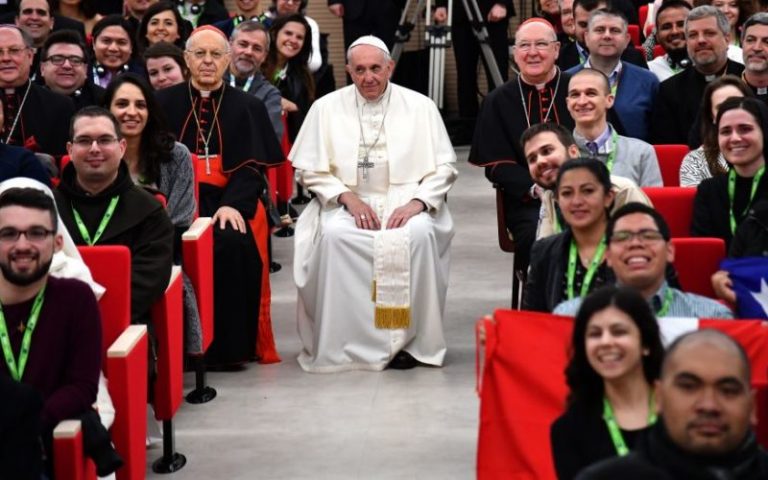Where Is Jesus Between His Death and Resurrection?
March 31, 2018Good Friday & the Hidden Meanings of “Golgotha”: Whose Skull Was It?
March 31, 2018
(Getty Images)
By John Monaco, Catholic Herald, Friday, 30 Mar 2018
We expressed our affection for the Extraordinary Form and the Church’s hard teachings. The official write-up downplayed both
This year’s synod, the 2018 Synod of Bishops on Youth, Faith, and Vocational Discernment is slated to begin in October, but the preparation has already been underway for months. In particular, official Facebook groups in six languages were created by the #Synod2018 leaders, inviting all Catholics from ages 16 -29 to participate. I was one of the members of the English-language Facebook group, where I and over two thousand peers answered questions posed by the group’s leaders.
Among the 15 questions asked regarding our experience of the Church included questions on the spiritual life, our hopes and dreams for the future, and the struggles of living in a fast-pace society. Many of the answers given by the youth were of a similar timbre: the Church should meet the young where they are, be present in the world as a witness of the Gospel, and work towards the common good. Themes of Francis’s pontificate (mercy, justice, encounter) were strongly echoed by those drafting the final document.
However, certain prominent themes coming from a number of youth in the Facebook group were largely ignored – namely, ones concerning orthodoxy and liturgy.
By and large, members of the Facebook groups voiced a desire for orthodox teaching and reverent liturgy, including specific references to promoting the Extraordinary Form. On the writing prompt concerning the resources in the Church which promote spiritual growth, I counted over almost 30 specifically mentioning the Latin Mass. The basic tenor of the comments was the same: the youth’s ordinary experience of the Sacred Liturgy in the post-conciliar Church left them wanting something “more”, and many of these young people found their desire for transcendence and awe within the Extraordinary Form, a desire that could not be satiated by banal folk music and anthropocentric liturgical behaviour.
Regarding Church doctrine, the vast majority of the youth expressed the importance of right belief, sound moral teaching, and not shying away from some of the hard truths of the Catholic faith. As the period for commenting came to a close, I and several others were confident that the final document would reflect our concerns.
However, when the final document was released and made public, it seemed as if an entire group of the youth was simply ignored. For example, in regard to the Sacred Liturgy, there was no explicit reference to the Extraordinary Form; rather, the text used the term “reverential traditional liturgies”, and only as part of a long list. This may have been partly a translation issue, but it still felt unrepresentative of the conversation.
Those who commented on the importance of strong moral teaching were also shocked to find that the final document regarded topics such as same-sex marriage and artificial contraception as “polemical issues” – as if they were merely political stances and not de fide truths grounded in Sacred Scripture and Tradition.
The reaction from the group members was quite negative, with one commenting: “[The document] does not reflect the very loud, dominating opinion voiced in this group that the Church is leaving behind the vast numbers of young people who want the liturgy to return to its traditional roots.”
Another said: “Despite the fact that so many young people expressed their requests about the Extraordinary Form, these opinions were simply omitted; there are merely some short mentions about ‘silence’. I have no words to express my deep sadness and feeling of being ignored.”
However, the controversy did not stop there. When more members challenged the group leaders regarding the glaring disconnect, their comments were deleted.
For those of us who expected a “listening Church”, this experience has left many frustrated and questioning the entire purpose of these Facebook groups. Isaac Withers, one of the writers of the pre-synod document, has said that “there was a huge online community asking for the Extraordinary Form,” and that the writers “were given only a summary of these comments”. If this was made clear from the start, I wonder whether the more orthodox youth would have bothered voicing their opinions at all.
John A Monaco is a graduate student at Boston College School of Theology and Ministry
http://catholicherald.co.uk/commentandblogs/2018/03/30/on-liturgy-and-orthodoxy-the-synod-document-forgot-our-voices/







